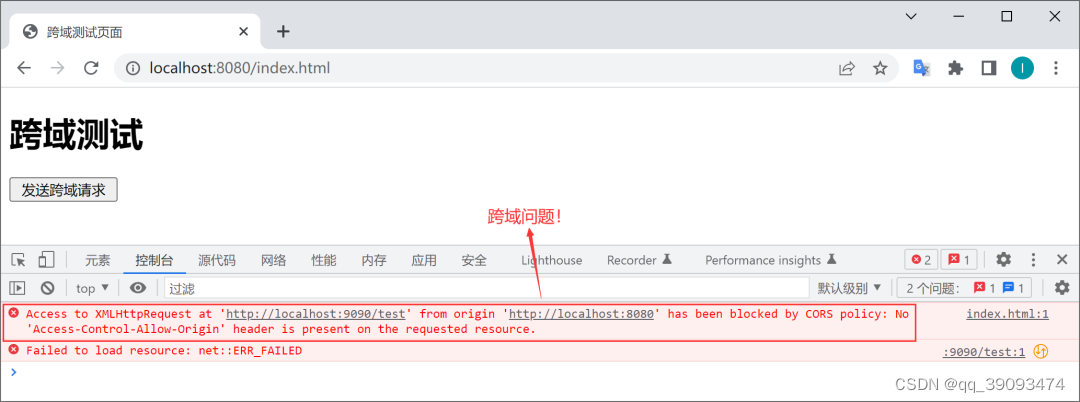一. 问题
前后端分离项目,将出现跨域问题。报错如下

二.分析问题
跨域错误源自于浏览器的同源策略,想要解决跨域首先要知道什么是同源策略?
同源策略:著名的安全策略,URL有三个基本组成部分:协议+域名或ip+端口,三个必须完全相同称之为同源,不同源的称之为跨域
URL 与 URL 对比:
http://localhost:3000/
https://localhost:3000/ 不同源:协议不同
http://localhost:3000/
http://127.0.0.1:3000/ 不同源:域名或ip不同
http://localhost:3000/
http://localhost:3001/ 不同源:端口不同
http://localhost:3000/
http://localhost:3000/ 同源
http://127.0.0.1:3000/
http://127.0.0.1:3000/ 同源
注意:同源策略不是服务器行为,而是浏览器的行为,服务器会正常响应请求,但是如果不同源会被浏览器拦截
三.解决问题。
1.vue配置代理服务器
(1)在vue.config.js文件中 (切记:修改后需要重启脚手架项目)
const { defineConfig } = require('@vue/cli-service') module.exports = defineConfig({ transpileDependencies: true, devServer: { proxy: { //Rev 0002. vue设置代理处理跨域问题 自定义请求的开头,使用代理方式处理/proxyServer开头的请求. "/proxyServer": { //Rev 0002. 往哪个服务器发请求 target: "http://localhost:8181", pathRewrite: { "^/proxyServer": "", }, }, //Rev 0002. 如果有其他网址也需要跨域则继续配置 }, } })
(2)配置URL根路径
axios.defaults.baseURL = '/proxyServer/'
(3)发送网络请求
this.$http.post('/admin/login')
2.使用 @CrossOrigin 注解可以轻松的实现跨域,此注解既可以修饰类,也可以修饰方法。当修饰类时,表示此类中的所有接口都可以跨域;当修饰方法时,表示此方法可以跨域;
@RestController @CrossOrigin(origins = "*") public class TestController { @RequestMapping("/test") public HashMap<String, Object> test() { return new HashMap<String, Object>() {{ put("state", 200); put("data", "success"); put("msg", ""); }}; } }
3.通过配置文件跨域
接下来我们通过设置配置文件的方式就可以实现全局跨域了,它的实现步骤如下:
- 创建一个新配置文件;
- 添加
@Configuration注解,实现WebMvcConfigurer接口; - 重写
addCorsMappings方法,设置允许跨域的代码。
/* * Rev 0000,解决vue跨域问题. */ @Configuration public class CrosSconfig implements WebMvcConfigurer { @Override public void addCorsMappings(CorsRegistry registry) { 添加映射路径 registry.addMapping("/**") // 允许跨域的域名或IP,星号代表允许所有 .allowedOrigins("*") // 请求允许的方法,如:GET, POST, PUT, DELETE等 .allowedMethods("*") // 预检间隔时间 .maxAge(168000) // 允许头部设置 .allowedHeaders("*"); } }





